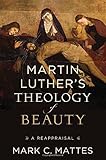Martin Luther's Theology of Beauty : A Reappraisal / Mark C. Mattes.
Material type: TextPublisher: Grand Rapids, Michigan : Baker Academic, a division of Baker Publishing Group, [2017]Copyright date: ©2017Description: xiv, 226 pages ; 24 cmContent type:
TextPublisher: Grand Rapids, Michigan : Baker Academic, a division of Baker Publishing Group, [2017]Copyright date: ©2017Description: xiv, 226 pages ; 24 cmContent type: - text
- unmediated
- volume
- 9780801098376
- 0801098378
- Theology of beauty
- 230.01 M4358
- BR333.3 .M364 2017
| Item type | Current library | Call number | Status | Date due | Barcode |
|---|---|---|---|---|---|
 Books
Books
|
New Theological College General Stacks | 230.01 M4358 (Browse shelf(Opens below)) | Available | 00031004 |
Includes bibliographical references (pages 205-215) and index.
Luther's use of philosophy -- Luther on goodness -- The early Luther on beauty -- The mature Luther on beauty -- Luther on the theology and beauty of music -- Luther on visual imaging -- Luther and nouvelle théologie -- Luther for a contemporary theology of beauty.
Many contemporary theologians seek to retrieve the concept of beauty as a way for people to encounter God. In this volume, one of today's leading Lutheran theologians argues that while Martin Luther's view of beauty has often been ignored or underappreciated, it has much to contribute to that quest. This groundbreaking book is the first extensive study on Luther's theological aesthetics. Contrary to the common misconception that Luther rejected beauty as a theological essential, Mark Mattes shows that the concept of beauty is actually a crucial theme for Luther's paradoxical understanding of justification by grace alone through faith alone. Christ "without form or comeliness" is God's gift of mercy to troubled sinners, so Christ is beautiful in God's estimation. Likewise, Christ is desirable for sinners seeking relief and liberation from the law's unrelenting accusations and from the enslavement of sin, death, and the devil. The new birth alters the human senses, opening them to discern and appreciate beauty as God has implanted it in the world. Mattes shows that Luther affirms music and visual imagery as human expressions of beauty and discusses the implications of Luther's aesthetics for music, art, and the contemplative life. The author explains that for Luther, the cross is the lens through which the beauty of God is refracted into the world. Mattes also puts Luther's view of beauty in opposition to some key contemporary theologians. -- Provided by publisher.


There are no comments on this title.